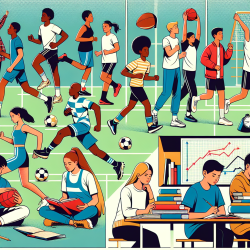Introduction
In recent years, the intersection of physical education and academic performance has garnered significant attention. The CHAMPS-Study DK, a natural experiment conducted in Denmark, offers valuable insights into this area. This study aimed to determine whether increasing physical education (PE) time in schools could enhance students' academic performance. Despite the intuitive connection between physical activity and cognitive function, the study's findings suggest that simply adding more PE classes may not directly translate to improved academic outcomes.
Understanding the CHAMPS-Study DK
The CHAMPS-Study DK involved a secondary analysis of data from a natural experiment where six intervention schools in Denmark increased their PE time to 270 minutes per week, compared to the national standard of 90 minutes. This increase was implemented over 3-7 years, with the aim of assessing its impact on students' exam performance at the end of compulsory education.
Key Findings
Despite the increased PE time, the study found no significant difference in the pooled exam performance between students from the intervention schools and those from control schools. The results were consistent across various subjects and demographic groups, indicating that additional PE alone may not be sufficient to enhance academic performance.
Implications for Practitioners
For educators and policymakers, these findings underscore the importance of a holistic approach to integrating physical activity into the school curriculum. Rather than simply increasing PE time, schools might consider:
- Integrating physical activity into academic lessons, such as using movement-based learning techniques.
- Ensuring that PE classes are designed to boost overall physical activity levels and cardiorespiratory fitness.
- Implementing comprehensive school-wide policies that promote an active lifestyle throughout the day.
Encouraging Further Research
The CHAMPS-Study DK highlights the need for further research into the mechanisms by which physical activity influences academic performance. Future studies could explore:
- The long-term impact of sustained physical activity on cognitive development.
- The effectiveness of integrating physical activity into various academic subjects.
- The role of different types of physical activities in enhancing cognitive and academic outcomes.
Conclusion
While the CHAMPS-Study DK did not find a direct link between increased PE time and improved academic performance, it provides a foundation for future research and policy development. By exploring innovative ways to integrate physical activity into the educational framework, we can better support students' overall development and academic success.
To read the original research paper, please follow this link: Does Additional Physical Education Improve Exam Performance at the End of Compulsory Education? A Secondary Analysis from a Natural Experiment: The CHAMPS-Study DK.










